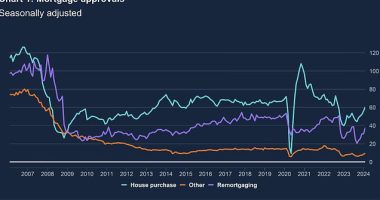
A view of oil-well in action during sunset at Elk Hills Oil Field as gas prices on the rise in California, United States on April 14, 2024.
Tayfun Coskun | Anadolu | Getty Images
Oil prices jumped more than 3% on Friday in Asia after Israel launched strikes on Iran, triggering fears of an expanding war in the Middle East.
A U.S. official confirmed with NBC News that Israel is conducting an operation in Iran.
Global benchmark Brent traded 3.63% higher at $90.27 a barrel, while the U.S. West Texas Intermediate rose 3.66% to $85.76 per barrel.
Safe haven assets also rose. Spot gold prices surged to a fresh all-time high of 2,411.09 per ounce, while the yen strengthened 0.45% to 153.93 against the U.S. dollar.
Iran’s Fars news agency reported that explosions were heard near the airport in the Iranian city of Isfahan, and that flights to Tehran, Isfahan and Shiraz airports have been suspended.
Flight tracking site Flight Radar 24 showed that multiple flights were diverted over Iranian airspace early Friday.
‘Shadow war’ is over
Israel on Sunday vowed to “exact a price” from Iran in response to the weekend’s large-scale aerial assault on the Jewish state. A day earlier, Iran struck military targets inside Israel, launching more than 300 missiles and drones in an unprecedented attack on Israeli soil.
“With Israel’s apparent strikes on Iran today, retaliating for Iran’s attack on Israel last Sunday, we now have a direct nation-on-nation hot war,” said Rapidan Energy’s Director of Global Oil Service, Clay Seigle.
“The ‘shadow war’ chapter has come to an end,” he added.
While Washington has pledged an “ironclad” commitment to Israel, President Joe Biden has also told Israeli Prime Minister Benjamin Netanyahu the U.S. will not join any offensive operations against Iran, a senior administration official told NBC News.
“The U.S. should avoid further entrapment in Israel’s efforts to drag U.S. military forces into a broader war with Iran,” said Sarah Leah Whitson, executive director of Democracy for the Arab World Now, or Dawn.
Israel’s decision to attack Iran in spite of pleas from its primary backers is a “clear indicator of how irresponsible and unaccountable the Israeli government is,” she added.
Seigle maintained that’s it’s still too early to determine what could happen next.
However, he pointed out that the “big risk” for oil markets in the expanding Middle East war is that oil exports from the Arabian Gulf will be cut off. The region is responsible for more than 20 million barrels of oil per day.
A disruption or closure of the Strait of Hormuz, a key chokepoint which sits between Iran and Oman and through which one-fifth of global oil production flows daily, would also cause oil prices to shoot higher.
“A Hormuz disruption would be very serious for the world economy, potentially driving oil prices well into the triple digits to levels that induce demand destruction,” he added.
This is is breaking news. Please check back for updates.
Read More: World News | Entertainment News | Celeb News
CNBC








